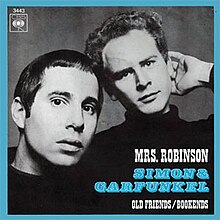| "Mrs. Robinson" | ||||
|---|---|---|---|---|
 One of the side-A labels of the US vinyl single crediting The Graduate as the source of the song. Another pressing credits the song's parent album Bookends as the source. | ||||
| Single by Simon & Garfunkel | ||||
| from the album Bookends and The Graduate | ||||
| B-side |
| |||
| Released | April 5, 1968 | |||
| Recorded | February 2, 1968 | |||
| Genre | Folk rock[1] | |||
| Length | 4:02 | |||
| Label | Columbia | |||
| Songwriter(s) | Paul Simon | |||
| Producer(s) |
| |||
| Simon & Garfunkel singles chronology | ||||
| ||||
| Music video | ||||
| "Mrs. Robinson" (audio) on YouTube | ||||
| Alternative release | ||||
 Artwork for the Dutch vinyl single; its similar variant mentions The Graduate above the song title. | ||||
"Mrs. Robinson" is a song by American folk rock duo Simon & Garfunkel from their fourth studio album, Bookends (1968). The writing of the song was begun before the 1967 film The Graduate, which contained only fragments of it. The full song was released as a single on April 5, 1968, by Columbia Records. Produced by Simon & Garfunkel and Roy Halee, the song was written by Paul Simon, who offered parts of it to movie director Mike Nichols alongside Art Garfunkel after Nichols rejected two other songs intended for the film. The Graduate's soundtrack album uses two short versions of "Mrs. Robinson". The song was additionally released on the Mrs. Robinson EP in 1968, which also includes three other songs from the film: "April Come She Will", "Scarborough Fair/Canticle", and "The Sound of Silence".
"Mrs. Robinson" became the duo's second chart-topper, reaching No. 1 on the Billboard Hot 100, as well as peaking within the top 10 of the United Kingdom, Ireland, and Spain, among other countries. In 1969, it became the first rock song to win the Grammy Award for Record of the Year. The song contains a famous reference to baseball star Joe DiMaggio. The song has been covered by a number of artists, including Frank Sinatra, the Lemonheads, and Bon Jovi. In 2004, it finished at No. 6 on AFI's 100 Years...100 Songs survey of top tunes in American cinema.
- ^ Valdez, Steve (2014). "Folk rock". In Henderson, Lol; Stacey, Lee (eds.). Encyclopedia of Music in the 20th Century. London: Routledge. p. 223. ISBN 978-1-135-92946-6 – via Google Books.